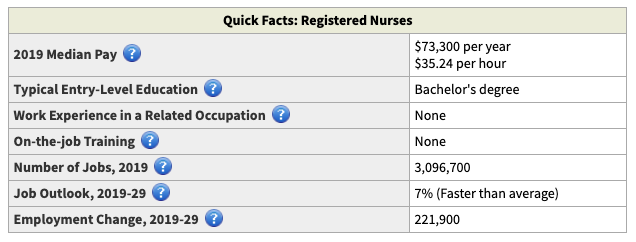LPNs vs RNs: What’s the Difference?
While RNs (Registered Nurse) and LPNs (Licensed Practical Nurse) are both fulfilling careers in healthcare, there are aspects of each that make them very different from one another. If you’re about to begin your educational journey as a nurse and unsure which path is right for you, it’s important to understand the following differences between RNs and LPNs.

1. Education
There’s a big difference between LPN and RN education and training programs. LPN programs tend to be more focused on hands-on, practical training, while RN programs center on theoretical classroom instruction in addition to clinical coursework. LPN programs are more focused. Therefore, they can be completed faster and in less time than RN courses, allowing graduates to earn a certificate in about 12 months. RNs earn their degrees in two to three years.
The shorter LPN program is a big draw for many students. However, if you’re looking to pursue a more specialized nursing career as an RN, a professional nursing degree program should be your direction (e.g., associate’s degree or bachelor of science degree).
2. Work Settings
Though similar, there are work environment differences between LPNs and RNs. LPNs are responsible for providing basic nursing care under the supervision of an RN. They’re tasked with feeding, dressing, and/or bathing patients, monitoring vital signs, applying and changing bandages, maintaining patient records, and accurately relaying patient concerns to other healthcare practitioners.
RNs are responsible for providing nursing care in most healthcare facilities. Their jobs require administering medication, operating and monitoring medical equipment, performing diagnostic tests and collecting lab samples, and educating patients and their families on the proper management of illnesses and treatments. As an RN, they have the option of specializing in specific fields of medicine as well.
3. Demand
According to studies, one million nurses are set to retire by 2030. Their retirements will coincide with Baby Boomers who will soon start to require more specialized care as they age. This means demand for healthcare practitioners will boom.
While both fields are primed for growth, LPNs are predicted to grow slightly faster than RNs. The Bureau of Labor Statistics states that LPNs are set for 9% growth through 2029, while RNs are going to see 7% growth in the same timeframe.
4. Licensing
While it takes less time to complete your studies as an LPN, both RNs and LPNs actually go through a similar licensing process. It starts with a screening process and a comprehensive background check, followed by the responsibility of demonstrating their ethical practice and scope of practice. LPNs and RNs must both pass a national exam—the NCLEX. The NCLEX is designed to test your skills as an RN or LPN based on learned knowledge and decision making skills. Because RNs are expected to do more complex types of patient care, RN exams cover more to ensure they’re ready to become a licensed nurse.
5. Earning Potential
Given the more in-depth patient care skills and tasks required from RNs, their income tends to be higher than LPNs, especially in entry-level positions.
However, in both fields, advancement opportunities abound. Moreover, as you take on more duties and responsibilities, you can expect the pay to increase accordingly. The differences in RN and LPN salaries depends largely on the current experience and level of responsibility they hold.
The key differences between LPNs and RNs could determine the healthcare path you choose towards building your nursing career. The education, training, and time it takes to become a competent nurse is already a big deciding factor.
While LPN training takes less time and offers faster access to a thriving nursing career, those with more time, or those who want to pursue a very specific nursing field, may opt for an RN associate’s degree or bachelor’s degree program.
While the scopes of practice and the care they deliver can vary, both LPNs and RNs have daily on-the-job duties that may overlap. Both are responsible for the care and well-being of their patients.
RNs and LPNs are also highly employable across different healthcare settings (e.g., hospitals, clinics, long term care, nursing homes). To advance in both careers, it’s necessary to be sociable, approachable, and personable with a sincere desire to help people.
HCI College offers nursing programs that provide the necessary training to succeed in a nursing career. Learn more here or get in touch with us today if you have any questions or want to discuss how to get started.














